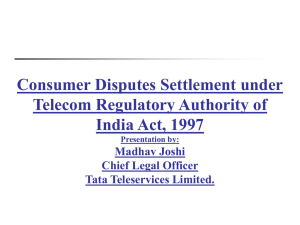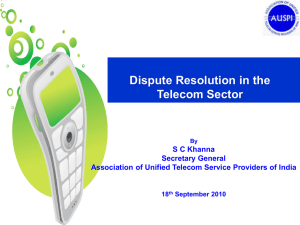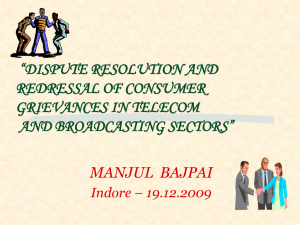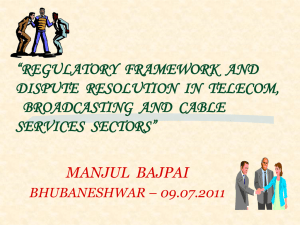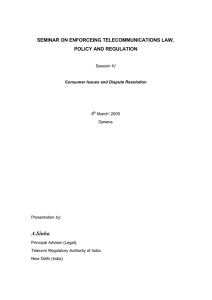AGENDA PRESENTATION ON TELECOM DISPUTES SETTLEMENT AND APPELLATE TRIBUNAL’S (TDSAT)
advertisement
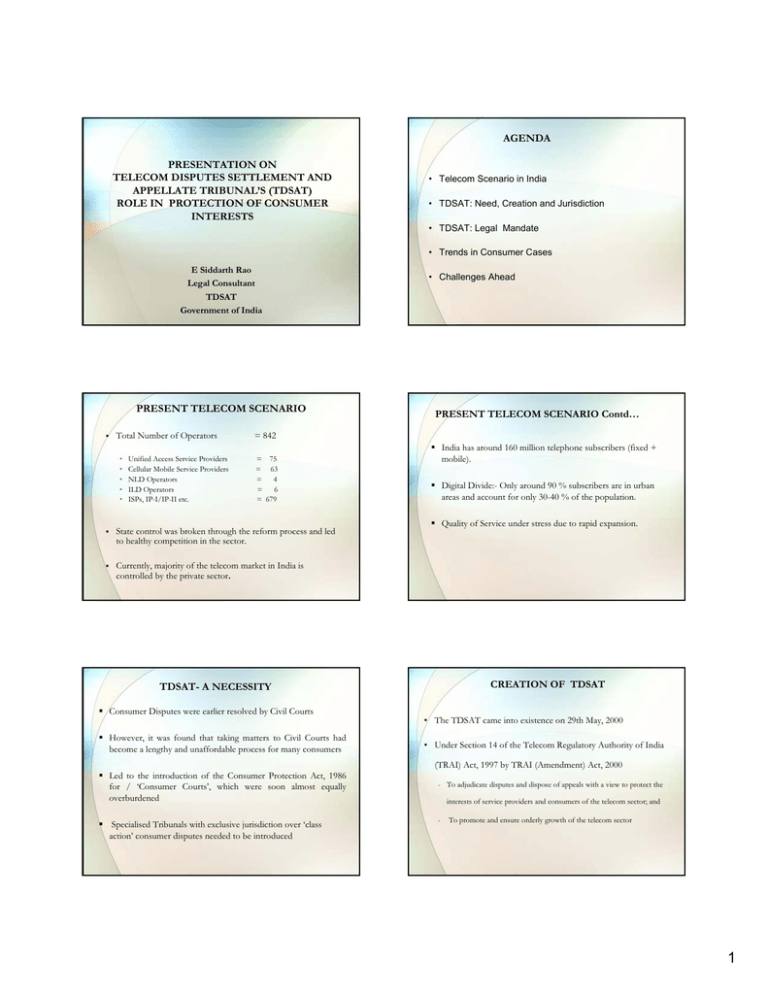
AGENDA PRESENTATION ON TELECOM DISPUTES SETTLEMENT AND APPELLATE TRIBUNAL’S (TDSAT) ROLE IN PROTECTION OF CONSUMER INTERESTS • Telecom Scenario in India • TDSAT: Need, Creation and Jurisdiction • TDSAT: Legal Mandate • Trends in Consumer Cases E Siddarth Rao Legal Consultant TDSAT Government of India PRESENT TELECOM SCENARIO Total Number of Operators • • • • • Unified Access Service Providers Cellular Mobile Service Providers NLD Operators ILD Operators ISPs, IP-I/IP-II etc. • Challenges Ahead PRESENT TELECOM SCENARIO Contd… = 842 = 75 = 63 = 4 = 6 = 679 State control was broken through the reform process and led to healthy competition in the sector. Currently, majority of the telecom market in India is controlled by the private sector. India has around 160 million telephone subscribers (fixed + mobile). Digital Divide:- Only around 90 % subscribers are in urban areas and account for only 30-40 % of the population. Quality of Service under stress due to rapid expansion. CREATION OF TDSAT TDSAT- A NECESSITY Consumer Disputes were earlier resolved by Civil Courts However, it was found that taking matters to Civil Courts had become a lengthy and unaffordable process for many consumers • The TDSAT came into existence on 29th May, 2000 • Under Section 14 of the Telecom Regulatory Authority of India (TRAI) Act, 1997 by TRAI (Amendment) Act, 2000 Led to the introduction of the Consumer Protection Act, 1986 for / ‘Consumer Courts’, which were soon almost equally overburdened Specialised Tribunals with exclusive jurisdiction over ‘class action’ consumer disputes needed to be introduced - To adjudicate disputes and dispose of appeals with a view to protect the interests of service providers and consumers of the telecom sector; and - To promote and ensure orderly growth of the telecom sector 1 JURISDICTION OF TDSAT • Prior to 2000 these adjudicatory powers were vested with the TRAI - The 2000 Amendment was brought in to avoid conflict of interest as the regulator (TRAI) could not be allowed to sit in judgement over appeals against its own decisions / Orders • “Broadcasting” and "Cable" services have also been included under the definition of 'Telecommunication Services' in the TRAI Act COMPOSITION AND FUNCTIONING OF THE TRIBUNAL • The Tribunal consists of Chairperson (a retired Judge of the Supreme Court of India or a Chief Justice of a High Court) and two Members (former Secretary to the Government of India) • Adjudication within 90 days or reasons for delay to be recorded • Appeal against order of TDSAT goes to Supreme Court only on question of law - Notification of the Government of India dated 09-01-2004 WHAT CAN THE TRIBUNAL ADJUDICATE UPON? RESTRICTIONS OVER TDSAT’S JURISDICTION TDSAT cannot adjudicate on matters relating to:- Adjudicates disputes between • Licensor and licensee; licensors and service providers and a group of consumers • Individual consumer disputes- maintainable only before Consumer Courts • Also, hears appeals against directions/decisions/orders of the Regulator. • Monopolistic and Restrictive Trade Practices (MRTP), which are defined and fall within the jurisdiction of the MRTP Act, 1969 • Disputes under Sec. 7B of Indian Telegraph Act 1885. (1876, 1860,1854) TDSAT’s DISPUTE SETTLEMENT RECORD WHO CAN PETITION / APPEAL ? Section14A(1) TRAI Act - The Central or State governments - A Local Authority - Any person YEAR CASE ADMITTED DISPOSAL PERCENTA GE OF DISPOSAL NO. OF CASES PENDING 2001 103 103 100.00 0 2002 93 91 97.84 2 2003 102 100 99.03 2 2004 247 225 91.03 22 2005 427 321 75.17 106 2006 As on 21-07 310 100 32.25 210 Total 1282 940 73.32 342 2 TDSAT AND CONSUMER INTERESTS Admits cases even if sent as e-mails / letter petitions by persons competent to litigate at the TDSAT including consumer groups Filing procedures of the TDSAT and all relevant laws and regulations are posted and updated on TDSAT’s website. (www.tdsat.nic.in) All judgements / orders and advance cause list of the TDSAT are uploaded to its website on a daily basis TDSAT AND CONSUMER INTERESTS Regular seminars held across India by TDSAT to create consumer awareness and inform stakeholders / citizens of TDSAT’s mandate and work Court fee exempted in deserving cases at the discretion of the Court CONSUMERS’ OPTIONS TDSAT TRAI CONSUMER FORA ‘ADALATS’( Dispute Settlement Proceedings) CONDUCTED BY SERVICE PROVIDERS TELECOM OMBUDSMAN TDSAT AND CONSUMER INTERESTS Cont… Legal Aid for consumers Article 14 Constitution of India: Equality before law Details of cases and dates of hearing etc. sent to litigants / advocates by SMS - “The State shall not deny to any person equality before the law or the equal protection of the laws within the territory of India.” TDSAT AND CONSUMER INTERESTS Cont… TDSAT AND CONSUMER INTERESTS Cont… Article 39-A of the Constitution of India: Equal Justice and free legal aid. Consumer cases at TDSAT - Majority of the consumer cases filed at the TDSAT have been in - “The State shall secure that the operation of the legal system promotes justice, on a basis of equal opportunity, and shall, in particular, provide free legal aid, by suitable legislation or schemes, or any other way, to ensure that opportunities for securing justice are not denied to any citizen by reason of economic or other disabilities.” relation to cable and broadcast matters - Telecom related consumer case at the TDSAT At the request of the party and if required, the Tribunal can appoint a Legal Aid Counsel. 3 TDSAT & CONSUMERS- GENERAL OBSERVATIONS Filing of cases by consumer groups at tdsat in comparison to the total number of cases is lower. TDSAT AND CONSUMERS- GENERAL OBSERVATIONS Prior consumer group consultations with the regulator (TRAI) reduce scope for disputes - Most telecom grievances of consumers involve individual disputes wherein the amounts involved are generally low - Regulations, tariff structures etc. evolving at a scorching pace. As TDSAT is at a nascent stage, time required for further awareness amongst consumers Only one Bench in the Capital ( New Delhi) Consumers may not pursue such Disputes - Difficult for telecom consumer groups to organise affected consumers and petition TDSAT in a short span of time CONCLUSION Existing telecom consumer groups need to THANK YOU recognise the advantage of TDSAT’s mandate and record of speedy disposal of cases and the most important reason for which telecom reform in India was initiated i.e. for the consumer 4
